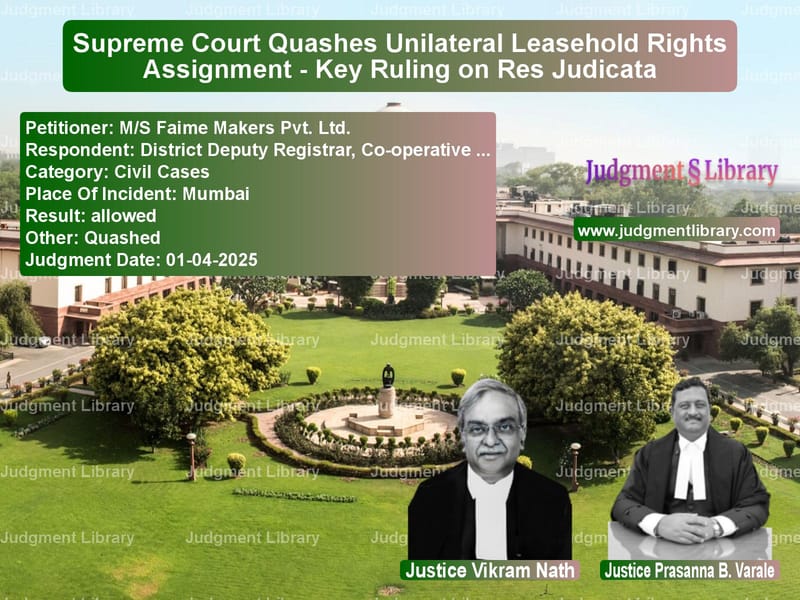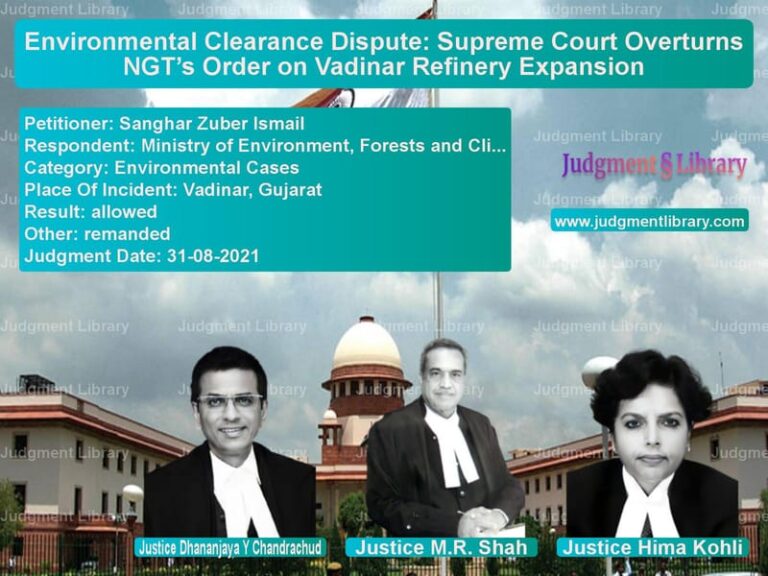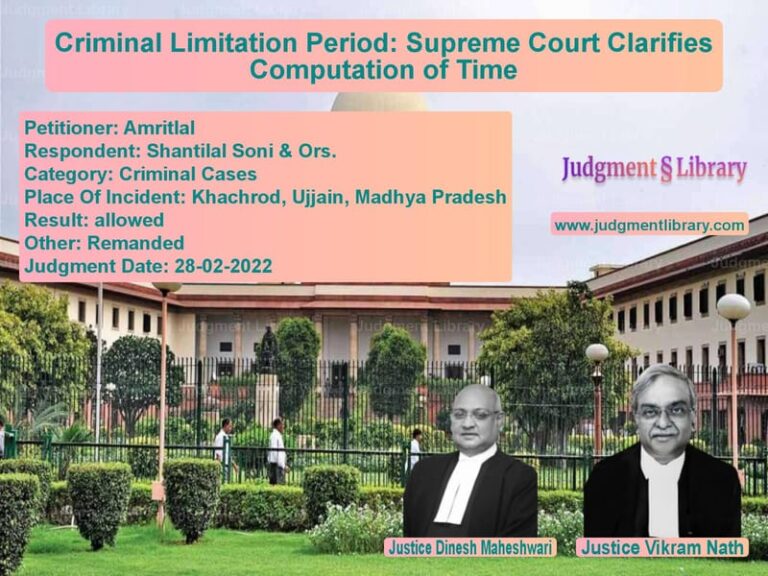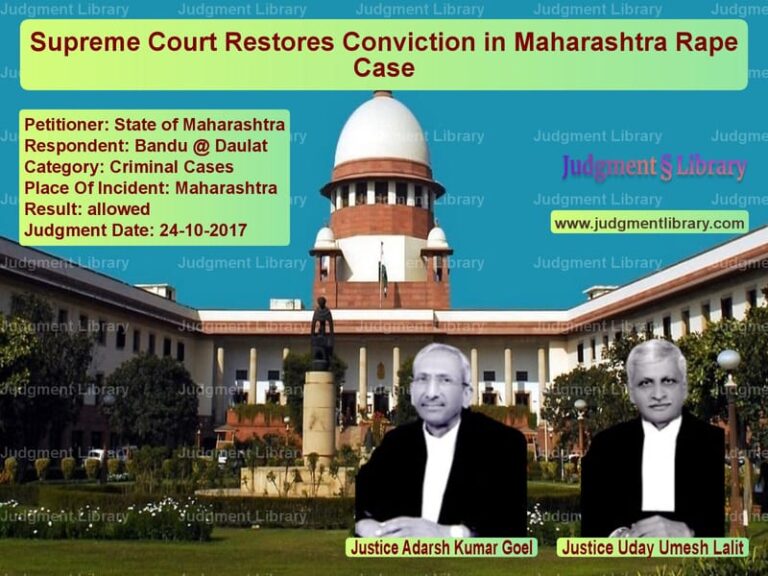Supreme Court Quashes Unilateral Leasehold Rights Assignment – Key Ruling on Res Judicata
In a significant judgment delivered on April 1, 2025, the Supreme Court of India allowed an appeal filed by M/S Faime Makers Pvt. Ltd. against the District Deputy Registrar, Co-operative Societies, Mumbai, and others. The case, M/S Faime Makers Pvt. Ltd. vs. District Deputy Registrar, Co-operative Societies (3), Mumbai & Ors., centered on the validity of a unilateral deed of assignment of leasehold rights granted to Prakash Apartment Co-operative Housing Society Limited (respondent No. 2-Society) under the Maharashtra Ownership of Flats Act, 1963. The Supreme Court’s ruling clarified the application of the principle of res judicata to quasi-judicial authorities and set aside the Bombay High Court’s order that had upheld the assignment.
Background of the Case
The dispute involved a parcel of land measuring 1,519.56 square meters (out of a larger property of 2,752.9 square meters) located at Bandivali Hill Road, Jogeshwari (West), Mumbai. The land was originally leased by Byramjee Jeejeebhoy Private Limited (BJPL) to Ramkishor Singh Kunjbihari (respondent No. 3) in 1952. Respondent No. 4, M/s Prakash Builders, constructed an unauthorized building on the land, which was later occupied by flat purchasers who formed the respondent No. 2-Society. In 2010, BJPL sold its rights in the property to the appellant (M/S Faime Makers Pvt. Ltd.), making the appellant the landowner under the 1963 Act.
After a series of legal disputes and settlements, the respondent No. 2-Society filed an application (No. 53 of 2020) before the Competent Authority under Section 11 of the 1963 Act, seeking a unilateral certificate of deemed conveyance. The Competent Authority dismissed this application on February 22, 2021, citing legal complications and directing the Society to resolve the issues in a civil court before reapplying. However, the Society filed a fresh application (No. 101 of 2021) on March 24, 2021, which was granted by the Competent Authority on October 5, 2021. The appellant challenged this order before the Bombay High Court, which dismissed the writ petition, leading to the present appeal.
Key Issues Before the Supreme Court
- Whether the Competent Authority’s order dated October 5, 2021, granting unilateral assignment of leasehold rights, was barred by the principle of res judicata?
- Whether the Competent Authority had the jurisdiction to entertain the second application (No. 101 of 2021) without the Society first resolving the legal complications as directed in the first order (dated February 22, 2021)?
- Whether the High Court erred in interpreting the first order as granting unconditional liberty to file a fresh application?
Appellant’s Arguments
Senior Counsel Shri Dama Seshadri Naidu, representing the appellant, made the following submissions:
“The Competent Authority had dismissed the first application filed by the respondent No. 2-Society under Section 11 of the 1963 Act by order dated 22.02.2021, on the finding that the issues involved were complicated and the respondent No. 2-Society ought to get the same sorted out by a competent Civil Court and only thereafter apply afresh. A further finding recorded was that no conveyance of sale could be directed. However, only conveyance of assignment of leasehold rights could be granted, but that too after sorting out of the issues. The said order dated 22.02.2021 was never assailed by the respondent No. 2-Society. Respondent No. 2-Society thereafter did not take any steps to approach the appropriate forum for sorting out or resolving out the issues mentioned in the order dated 22.02.2021 and instead, within a month, it moved a second application before the Competent Authority on 24.03.2021, registered as Application No. 101 of 2021, seeking relief for the unilateral assignment of leasehold rights in favour of respondent No. 2-Society. The submission was that the second application was not maintainable without the issues being resolved by the competent Civil Court as directed in the order dated 22.02.2021. The second application for leasehold rights could have been filed only after the issues resolved by the competent Civil Court. The second application was thus barred by the principle of res judicata, and the Competent Authority, while allowing the second application, committed a serious error in entertaining the same.”
Mr. Naidu also argued that the Competent Authority, being a quasi-judicial body, lacked the power to review its earlier order and that the High Court had misinterpreted the first order as granting unconditional liberty to file a fresh application.
Respondent’s Arguments
Counsel for the respondent No. 2-Society countered the appellant’s submissions as follows:
“The High Court correctly appreciated and interpreted the first order dated 22.02.2021 to record a finding that the said order granted unconditional liberty to the respondent No. 2-Society to file a fresh application for the assignment of leasehold rights. It was next submitted that the second order dated 05.10.2021 would not amount to a review, as it was dealing with an application seeking a distinct relief from the first application, and in view of the liberty granted, there was no question of any review. The second application was to be dealt with on its own merits, independent of the first order rejecting the first application.”
The respondent also contended that the appellant’s claim about the demarcation of the land was unsubstantiated, as no supporting documents were filed.
Supreme Court’s Analysis and Decision
The Supreme Court, comprising Justices Vikram Nath and Prasanna B. Varale, analyzed the Competent Authority’s first order (dated February 22, 2021) and the principle of res judicata in the context of quasi-judicial authorities. The Court’s key findings are summarized below:
Interpretation of the First Order (Dated February 22, 2021)
The Court emphasized that the first order clearly directed the respondent No. 2-Society to resolve the legal complications before a civil court before reapplying for leasehold rights. The Court quoted the relevant extract from the order:
“…Therefore, the petitioner has to appeal to the appropriate court in this regard. As there is a legal complication in this case, the authority will not be able to make a human transfer in the name of the applicant society. Due to this, the applicant society should only demand assignment of leasehold claim and also the competent court should resolve the legal issues related to the transfer of the name of the respondent No. 3 of the rate of income. It is not possible to transfer the leasehold right of the said property in the name of the applicant Society unless these matters are settled. Therefore, I am convinced that after the settlement of these matters, the applicant should be allowed to re-apply for the human transfer of the leasehold rights of the said property and the application submitted by the applicant Society should be rejected.“
The Court held that the High Court’s interpretation of this order as granting unconditional liberty was incorrect.
Applicability of Res Judicata to Quasi-Judicial Authorities
The Court reaffirmed that the principle of res judicata applies to quasi-judicial authorities, citing its earlier decisions in Ujjam Bai vs. State of U.P. (1962) and Abdul Kuddus vs. Union of India (2019). The Court observed:
“It has been settled by this Court that the principle of res judicata applies to and binds quasi-judicial authorities. This Court in Ujjam Bai vs. State of U.P. has taken the view that principles of res judicata equally apply to quasi-judicial bodies. Whenever a judicial or quasi-judicial tribunal gives a finding on law or fact, its findings cannot be impeached collaterally or in a second round and are binding until reversed in appeal or revision or by way of writ proceedings.”
The Court held that the Competent Authority’s first order had attained finality and could not be circumvented by filing a fresh application without resolving the complications as directed.
Jurisdiction of the Competent Authority
The Court ruled that the Competent Authority, being a quasi-judicial body, lacked the power to review its earlier order or entertain a second application contrary to its findings. The Court emphasized that the Authority’s jurisdiction was limited by the statutory framework of the 1963 Act.
Conclusion
The Supreme Court allowed the appeal, set aside the Bombay High Court’s order, and quashed the Competent Authority’s order dated October 5, 2021. The Court held that the respondent No. 2-Society’s second application (No. 101 of 2021) was barred by res judicata and that the Society could only reapply after resolving the legal complications as directed in the first order. The judgment reinforces the binding nature of quasi-judicial decisions and the importance of adhering to procedural directives issued by competent authorities.
Petitioner Name: M/S Faime Makers Pvt. Ltd..Respondent Name: District Deputy Registrar, Co-operative Societies (3), Mumbai & Ors..Judgment By: Justice Vikram Nath, Justice Prasanna B. Varale.Place Of Incident: Mumbai.Judgment Date: 01-04-2025.
Don’t miss out on the full details! Download the complete judgment in PDF format below and gain valuable insights instantly!
Download Judgment: ms-faime-makers-pvt-vs-district-deputy-regi-supreme-court-of-india-judgment-dated-01-04-2025.pdf
Directly Download Judgment: Directly download this Judgment
See all petitions in Property Disputes
See all petitions in Lease Agreements
See all petitions in Contract Disputes
See all petitions in Judgment by Vikram Nath
See all petitions in Judgment by Prasanna Bhalachandra Varale
See all petitions in allowed
See all petitions in Quashed
See all petitions in supreme court of India judgments April 2025
See all petitions in 2025 judgments
See all posts in Civil Cases Category
See all allowed petitions in Civil Cases Category
See all Dismissed petitions in Civil Cases Category
See all partially allowed petitions in Civil Cases Category







